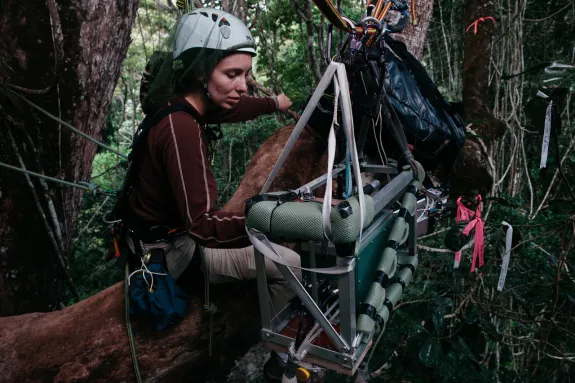
In 2012 University of Arizona (UA) envisioned a grand opportunity for implementing a new science of ‘Ecosystem Genomics’. The Ecosystem Genomics Initiative seeks to “Discover the emergent properties and processes of ecosystems through ‘top down’ analysis of communities, populations and organisms, and ‘bottom up’ analysis of genomes, transcriptomes and metabolomes.”
The central factors that are missing, but required, to translate genomics into ecosystem processes are foundational theory, case studies and models. The absence of these elements prevents us from addressing questions such as: Why are some genes more important than others in determining the aggregate traits of ecosystems? To what degree do plant genomes control the community assembly of soil microbial genomes, and produce a microbiome that determines ecosystem aggregate traits? What are the scaling ‘conveniences’ that will enable us to represent the translation from genes to traits to processes in models of the entire earth system? To link genomics to processes, and thus create the predictive framework we seek, foundational theory must be developed to define the complete genes-to-ecosystems translation. Case studies should be used to align measurements of genes, traits and processes in complementary environments and systems. Through this alignment, we can be sure we have all the elements of the theory represented in specific ecosystems. With theory and case studies in hand, we can iteratively develop, test, and refine hierarchically-organized models. The discipline of ecosystem genomics that we envision will advance a broad framework for predictive ecosystem genomics. Our research will build this framework through an integrated portfolio of complementary questions, scales, and ecosystems. Through research and education activities we will create international impact by designing new types of models that inform global climate policy, identifying genes and genomic interactions that enhance crop yield, and training a new generation of students to join the national workforce in fields such as ecosystem management, medical genetics and food security.
Funding opportunities are diverse and generous including government and private foundations.
The science is inclusive and embraces strengths across campus (from Biosphere 2 to CyVerse ).
The Ecosystem Genomics Graduate Interdisciplinary Program (ECGN GIDP) nucleates intellectual exchange in this area and prepares U of A graduates in an emerging field.
“BIG DATA” needs interface with flagship NSF programs ($434M NEON), and UA-led iPlant Collaborative (uniting initiatives in Health Informatics, iPlant and microbiology via iMicrobe).

